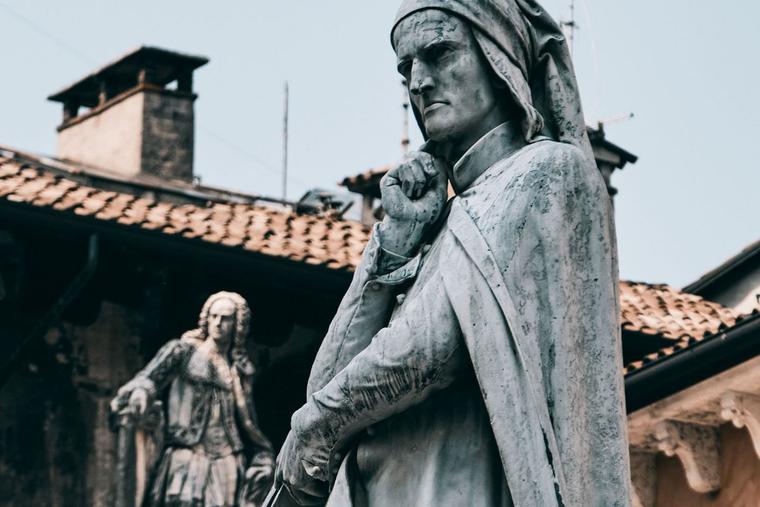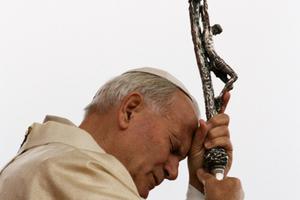Dante’s Message From the Underworld to Today’s World
COMMENTARY: The great medieval Catholic poet still has lessons to impart — 700 years after his death.

I have heard that after Dante’s Inferno had been made public, boys in the streets of Verona tagged after Dante, crying, “Look at the man who went to hell! Look at the man who went to hell!”
Some things never change.
Perhaps those merry children would grow up someday and see that if you do not draw near to the darkness of suffering or confront the emptiness of your own sin, you will do much to make a hell on earth. That includes the blank and insipid hell of a life in which nothing is worth dying for. Think of the opportunists just within the gates of Dante’s hell, condemned to run forever after an empty banner.
But no one will accuse Dante, who died 700 years ago Sept. 14, of being a trimmer, cutting his cloth to fit the times. He was always a passionate and decided political actor. So the state of his persona at the beginning of Inferno is something of a riddle:
Midway upon the journey of our life
I found myself in a dark wilderness,
for I had wandered from the straight and true.
How hard a thing it is to tell about, that wilderness so savage, dense, and harsh, even to think of it renews my fear!
It is so bitter, death is hardly more — but to reveal the good that came to me, I shall relate the other things I saw.
How I first entered, I can’t bring to mind,
I was so full of sleep just at that point
when I first left the way of truth behind.
He was “full of sleep,” he says. He had entered una selva oscura — “a dark woods,” as the phrase has ever been rendered; but in my own translation, I took a chance, wishing to stress the savagery implicit in the Italian selva: It is a “dark wilderness.”
Mere metaphor, you may say. He is just attempting to render a mood. But that will not work.
It is not that medieval artists were ignorant of metaphors or of the moorlands of the soul.
It is that if you said to them that they included a thing because it fit the mood, they would be indignant; it would strike them as an accusation, much as if you had said to Shakespeare that a certain part of a scene — for instance, Hamlet’s conversation with the gravediggers — was there simply for “comic relief.”
Let us assume that these artistic giants could attain many ends at once. Dante has been a bold and energetic political actor.
We learn it right away, too. His conversation with Ciacco — “Porky,” we might call the glutton — is entirely about Florentine politics, and he is careful to let us know, again and again, that his exile from his native city draws ominously near.
Yet here is his persona, not in city alleys, but in a wilderness. And he is not awake, making political moves, arranging the White Guelphs (his family’s party) against the Blacks, but “full of sleep.”
How can you be full of sleep when you are struggling constantly for justice and the common good?
How can you be in a savage wilderness when, for you, life is defined by the city?
There is no sense, none, that Dante has washed his hands of civic life, to retire to the country and nature, whatever that is. That kind of romantic mist and comfortable world-weariness is utterly foreign to the medieval spirit.
Why, the last words of the blessed Beatrice will be a blunt condemnation of wicked popes, as Clement V, when he dies, will force “him of Anagni deeper down his hole.” That is, Clement will be stuffed into the same hole in the floor of hell with his predecessors in wickedness, including “him of Anagni,” Boniface VIII, Dante’s concerted enemy and the sitting pope in 1300, when the journey to the hereafter is said to take place.
Action in the world can be like a drugged sleep, and if your city is not in a deep sense oriented toward the divine, it will be either a non-city, a kind of legal fiction, or an anti-city, filled with savagery, even if the savages use computers and can fly around the globe.
Pascal said that the great trouble with man was that he could not rest still in his own room. Political causes, filled with passion and noise, may be just or unjust, but the actors in them are in danger of losing their hold on their real position, dangling between heaven and hell.
It is much easier to read the political news than to look in the mirror.
It is easier to live in the bright neon lights of the world than in the darkness where you are alone with yourself, your sin, your folly, and the God who loves you rather more than you really want to be loved. In this sense, Dante is the great poet of existential crisis, 600 years before the word “existentialist” was coined. Think again of those opening lines. Dante has not drawn them from his imagination only. They echo the Canticle of Hezekiah, recited in the Tenebrae service on Holy Saturday: In dimidio dierum meorum vadam ad portas inferi (“In the middle of my days I went down to the gates of the underworld”). Hezekiah has just been informed that he must soon die. He prays to God, who grants him another 15 years of life.
The application of the canticle to Holy Saturday is most fitting: for Christ has died and not yet risen from the dead, and the Church believes that in a mysterious way he harrowed hell, preaching to the spirits in chains, as St. Peter says, and robbing Satan, the robber, of his prey.
It is the shadow time, the blank time, the day that does not count in the roll.
Now, our character Dante will go down to the gates of the underworld, but here, at the beginning, he is not there at all.
He is in a wild nowhere. He is asleep with eyes wide open.
To go to those gates, to confront human evil directly, to pray to God, to embark upon a journey of self-examination, penitence and slow instruction in love, is given to him as a gift. It is a great gift indeed.
We can look upon those gates now, and see ourselves for what we are, and pray for life as Hezekiah did, or we can look upon them after we have died and can no longer return to the way of truth. Choose.
The defining characteristic of hell is that there is no hope: “Abandon all hope, you who enter here,” reads the final line of the inscription over the gates.
What I have here written is not optimistic. Optimism is the charlatan with shells and a quick hand. Hope is the real giver of treasure.
People consumed with politics and the noise of this world lurch from one confidence man to another. Surely the pearl of great price is under that shell here! No hope, not there.
Our Hope was crucified upon the Hill of the Skull, long ago — and rose from the tomb on the third day.
- Keywords:
- dante
- anthony esolen

















